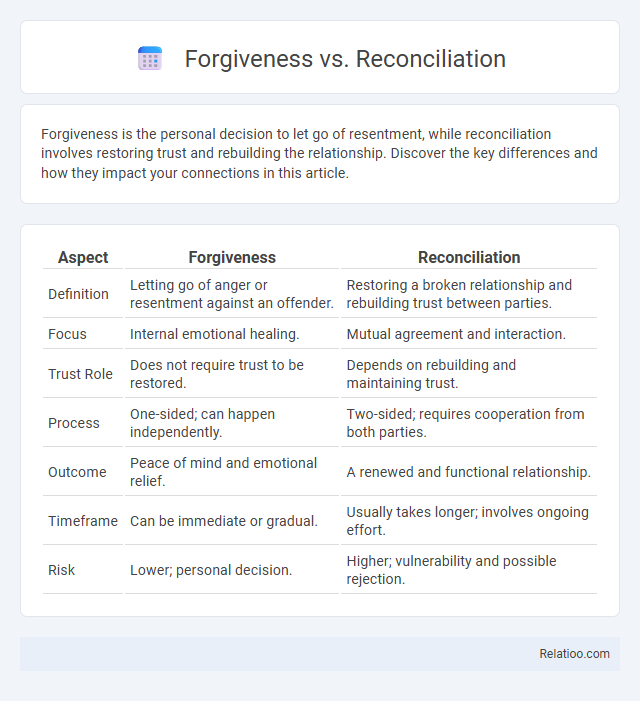Forgiveness is the personal decision to let go of resentment, while reconciliation involves restoring trust and rebuilding the relationship. Discover the key differences and how they impact your connections in this article.
Table of Comparison
| Aspect | Forgiveness | Reconciliation |
|---|---|---|
| Definition | Letting go of anger or resentment against an offender. | Restoring a broken relationship and rebuilding trust between parties. |
| Focus | Internal emotional healing. | Mutual agreement and interaction. |
| Trust Role | Does not require trust to be restored. | Depends on rebuilding and maintaining trust. |
| Process | One-sided; can happen independently. | Two-sided; requires cooperation from both parties. |
| Outcome | Peace of mind and emotional relief. | A renewed and functional relationship. |
| Timeframe | Can be immediate or gradual. | Usually takes longer; involves ongoing effort. |
| Risk | Lower; personal decision. | Higher; vulnerability and possible rejection. |
Understanding Forgiveness: Definition and Importance
Understanding forgiveness involves recognizing it as a conscious decision to release feelings of resentment or vengeance towards someone who has caused harm. Unlike reconciliation, which requires mutual agreement and rebuilding trust, forgiveness is an internal process centered on your emotional well-being. Prioritizing forgiveness promotes healing, reduces stress, and fosters personal growth, highlighting its essential role in maintaining mental and emotional health.
What is Reconciliation? Key Concepts Explained
Reconciliation is the process of restoring trust and relationship between parties after a conflict or harm, involving mutual acknowledgment of wrongdoing and commitment to change. It differs from forgiveness, which is an internal act of releasing resentment without necessarily restoring the relationship. Key concepts of reconciliation include dialogue, accountability, empathy, and the rebuilding of emotional or social bonds.
The Core Differences Between Forgiveness and Reconciliation
Forgiveness involves releasing resentment and letting go of feelings of anger or hurt, whereas reconciliation requires restoring trust and rebuilding a relationship between parties. Forgiveness can occur unilaterally, without the offender's participation, while reconciliation depends on mutual agreement and ongoing communication. The core difference lies in forgiveness being an internal process for emotional healing, whereas reconciliation is an external process aimed at reestablishing a functional connection.
Psychological Benefits of Forgiveness
Forgiveness promotes psychological benefits such as reduced stress, lower levels of anxiety, and improved emotional well-being by allowing individuals to release grudges and resentment. Unlike reconciliation, which requires rebuilding trust and a mutual agreement, forgiveness is a personal process that can occur without further interaction with the offender. Therapeutic studies demonstrate that forgiveness significantly enhances mental health by fostering empathy, promoting emotional healing, and decreasing symptoms of depression and anger.
Emotional Healing Through Reconciliation
Emotional healing through reconciliation involves more than just forgiveness; it requires rebuilding trust and understanding between conflicting parties, fostering a deeper connection that promotes lasting peace. Forgiveness releases you from resentment and emotional pain, while reconciliation restores the relationship by addressing underlying issues and creating mutual respect. Prioritizing reconciliation in your healing process helps transform hurt into growth, enabling genuine emotional renewal.
Situations Where Forgiveness Is Enough
Forgiveness is enough in situations where the primary goal is to release personal resentment and promote inner peace without restoring the relationship or trust, such as when the offending party is unwilling or unable to engage in reconciliation. In cases of minor offenses or misunderstandings, forgiving allows individuals to move forward emotionally while maintaining boundaries. Reconciliation requires mutual effort and trust rebuilding, which may not always be possible or desired, whereas forgiveness remains a personal choice that fosters emotional healing independently.
When to Pursue Reconciliation After Harm
Reconciliation should be pursued after harm when both parties demonstrate genuine remorse and a willingness to rebuild trust, creating a safe environment for open communication. Forgiveness can be granted independently as a personal healing process without requiring mutual agreement or restored relationship, emphasizing emotional release over interaction. Prioritizing reconciliation depends on the severity of harm and the readiness of individuals to engage collaboratively in repairing the relationship, ensuring sustainable resolution and mutual respect.
Barriers to Forgiveness and Reconciliation
Barriers to forgiveness include deep emotional pain, unresolved resentment, and lack of empathy, which can prevent you from releasing negative feelings. Reconciliation faces obstacles such as broken trust, fear of repeated harm, and misaligned intentions between parties. Understanding the distinctions between forgiveness and reconciliation is crucial, as forgiveness is an internal process, while reconciliation requires mutual effort and communication to restore a relationship.
Steps Toward Forgiveness Without Reconciliation
Taking Steps Toward Forgiveness Without Reconciliation involves acknowledging your pain, setting emotional boundaries, and focusing on personal healing without the need for rebuilding the relationship. Forgiveness is an internal process that frees you from resentment, whereas reconciliation requires mutual trust and effort, which may not always be possible or healthy. Prioritizing your emotional well-being allows you to move forward independently, even if the other party does not participate in repairing the relationship.
Choosing Between Forgiveness and Reconciliation in Relationships
Choosing between forgiveness and reconciliation in relationships involves recognizing that forgiveness is a personal process of letting go of resentment, while reconciliation requires mutual effort to rebuild trust. Forgiveness can occur independently of reconciliation, allowing individuals to heal emotionally even when repairing the relationship is not possible. Prioritizing forgiveness fosters inner peace, whereas reconciliation demands open communication, accountability, and a willingness to restore the relationship's foundation.

Infographic: Forgiveness vs Reconciliation
 relatioo.com
relatioo.com